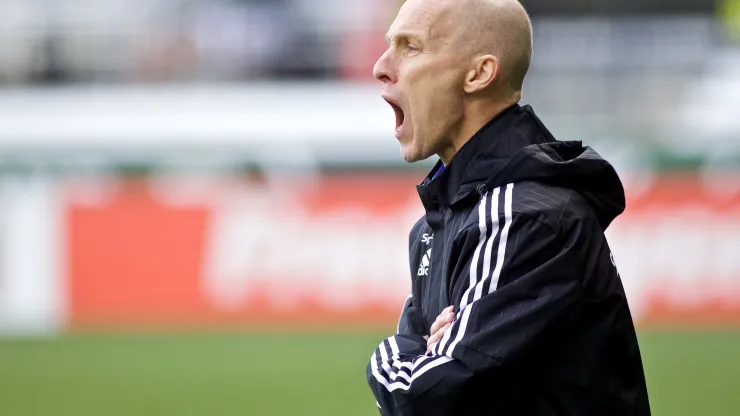Funny how history changes the way we look at things.
Where some fans and media once lamented the Plain Jane, highly vanilla ways under former U.S. manager Bob Bradley, you wonder if some of those very same people are longing for the stability and general predictability of Bob Bradley?
Time will tell if Jurgen Klinsmann’s quirky ways will displace the American effort from its comfort zone or if his time in charge will finish as “something different, but not a step forward?” But that’s another debate.
For now, let’s talk about Bradley. Because what you got from him was a team highly organized in every way (on and off the field). Whereas Klinsmann likes to challenge players with less familiar roles and requests, Bradley’s teams thrived on the very opposite: on predictability in approach from the moment they arrived into camp until the very last kick of the ball on match-day.
We can argue all day about which set of philosophical tenets best served the United States national team. It’s even possible that Bradley’s and his four-door sedan were best to drive the program through the late 2000s, with Klinsmann necessarily revving the fancy sports car to take the curves ahead at a higher speed.
But again, that’s another debate.
What I’m here to say is this: Bradley is a good manager. And if I’m running a Major League Soccer team that is struggling for traction, I am moving heaven and Earth to put Bradley in charge.
You may not have been in love with the identity of Bradley’s teams (although everyone loved the scrappiness), but they had an identity. That included a structure so tightly woven that things wouldn’t fall apart in the last 10-15 minutes as players tired or concentration waned – and we know that has been an alarming trend under Klinsmann.
Quick, what is Philadelphia’s identity? Jim Curtin’s team has no creativity through the middle. And the wingers, Sebastian Le Toux and Andrew Wenger, seem to have regressed. At the other end, they cannot defend set pieces. Result: winless in four.
Montreal is also winless, although only in three. And they did score for the first time over the weekend. That came in a draw at home – against an expansion side, Orlando City. Yes, they are doing well in CONCACAF Champions League, and that may help Frank Klopas keep his job for a while. But given his inability to make hay previously in Chicago, stacked on top of last year’s pitiful showing in Montreal (28 points, fewest in the league), you wonder for how long?
Pablo Mastroeni is struggling mightily in Colorado, the league’s only team without a goal. The Rapids now carry the distinction as the first MLS team to open a season with three consecutive scoreless draws. Solid on defense, but awful on the attack, Colorado has not scored in 510 minutes going back to last year. That’s longer than some pro careers! The Rapids are also at 17 straight without a win, the second-longest MLS streak over a 20-year stretch.
SEE ALSO — Thomas Rongen discusses differences between Bob Bradley and Klinsmann
Then there is Chicago, where it all started for Bradley. Frank Yallop’s team got its first win of 2014, over the aforementioned Philadelphia Union. It was a 1-0 squeaker. Well, a win is a win … but I doubt anyone will start pre-planning championship parades based on this one.
Since winning the West with San Jose by doctrine of crash and bash, Yallop has won 10 of 53 MLS matches. If you watch the Fire this year, there isn’t a lot on which to pin legitimate playoff hopes.
Bradley won a league title in Chicago (1998). Later, he didn’t set the world on fire at Chivas USA, but he built an important infrastructure for a club that, as we would find out, was never going anywhere. It was always an impossible task, and Bradley did as well as anyone could.
Now he is doing well now with Stabæk in Norway. It was always a pathway for him into something bigger and better in Europe, and he may still be looking for that. It may be that Bradley has no interest in MLS; he has passed on opportunities to get back into the league.
Then again, things change. MLS is changing, and fast. It’s a far better league than when he left 10 years ago, so the challenge here might become increasingly appealing.
Plus, at 57, he might get to a point where he wants to be closer to his family and his grandkids.
If I am running an MLS club with a struggling manager and a wobbly infrastructure, I’d be checking on flights into Norway … and doing what I could to get Bradley up to a podium for a big announcement as soon as possible.
Editor’s note: Steve Davis writes a weekly column for World Soccer Talk. He shares his thoughts and opinions on US and MLS soccer topics every Wednesday, as well as news reports throughout the week. You can follow Steve on Twitter at @stevedavis90. Plus, read Steve’s other columns on World Soccer Talk.
200+ Channels With Sports & News
- Starting price: $33/mo. for fubo Latino Package
- Watch Premier League, Women’s World Cup, Euro 2024 & Gold Cup
The New Home of MLS
- Price: $14.99/mo. for MLS Season Pass
- Watch every MLS game including playoffs & Leagues Cup
Many Sports & ESPN Originals
- Price: $10.99/mo. (or get ESPN+, Hulu & Disney+ for $14.99/mo.)
- Features Bundesliga, LaLiga, Championship, & FA Cup
2,000+ soccer games per year
- Price: $5.99/mo
- Features Champions League, Serie A, Europa League & Brasileirāo
175 Premier League Games & PL TV
- Starting price: $5.99/mo. for Peacock Premium
- Watch 175 exclusive EPL games per season







